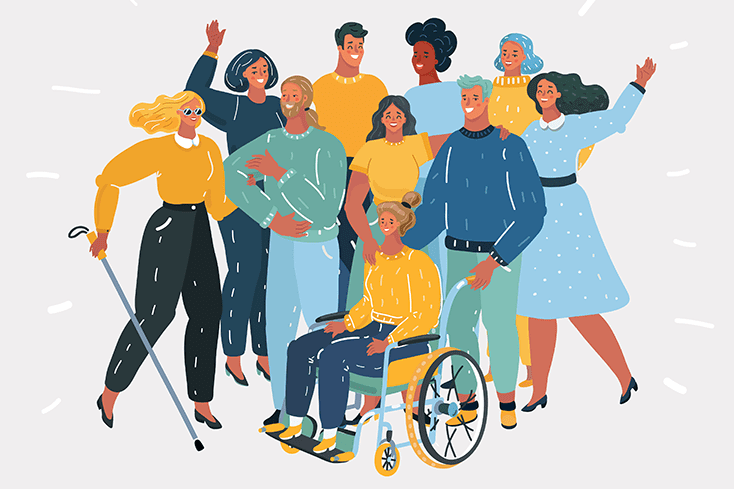April 25, 2022
By Sheri Thomas

“Two-Pound Baby Wins Life Fight,” was the front-page headline of the Feb. 21, 1962 edition of the Jefferson City, Missouri Post-Tribune. That baby was me, and the story celebrated my release from the hospital after spending months in an incubator struggling to survive.
At 15 months old, doctors told my parents that I had an intellectual disability. My mother questioned this diagnosis, and she fought to find another answer. Several months later, I was diagnosed with cerebral palsy. I experienced a childhood filled with leg braces, painful surgeries and bullying.
As I got older, my various physical disabilities progressed. I found myself looking for ways to advocate for people with disabilities. Beginning in 2001, I dedicated my time to breaking down barriers surrounding physical disabilities and promoting full accessibility on various disability commissions and committees in Maryland.
My journey to tackle ableism, however, would not end there. After being diagnosed with a mental health condition, I began to unpack the realities of the stigma surrounding mental illness — and discovering how much progress needs to be made.
My Experience with Mental Illness and Shame
In 2014, I was hospitalized and first diagnosed with bipolar disorder. As I struggled to accept the diagnosis, I refused to follow up with psychiatric treatment or take my medication as directed, which led to a much more serious bipolar episode in 2019 that almost cost me my life. After surviving a suicide attempt, I listened to my doctors, took my medication and, more importantly, accepted my diagnosis. Today, I take my medication as directed and continue to see my psychiatrist on a regular basis.
When I was first hospitalized in 2014, however, I was too ashamed to tell anyone that I had a mental health issue. I was afraid to talk about it because I, like so many others, held deeply internalized negative attitudes about mental illness and seeking help. This stigma was something that all of my fellow patients wrestled with during their hospitalizations: They simply didn’t know how to tell other people about their mental illness.
During group therapy we were told we shouldn’t be afraid or ashamed to share our diagnosis with others. But that wisdom was hard to accept. Frankly, my initial reaction was, “It’s one thing to tell people that I was hospitalized due to my cerebral palsy. It’s a whole other thing to say I am bipolar, and I just got out of the hospital’s Behavioral Health Unit (what many people incorrectly label the psych ward).”
Before being hospitalized for mental health treatment, I had only heard people with mental health issues described as “crazy,” so I was afraid to open up about my own diagnosis.
Encouraging Others to Talk About Mental Health
Since my time in treatment, I have noticed that we seem to have no trouble talking endlessly about our physical health when we get together with family and friends: “I just went to see a new orthopedist.” “I just completed a new round of physical therapy.” etc. Our health comes up naturally in both serious conversations and small talk. But we don’t open up about our mental health in a similar, casual way.
You rarely hear someone mentioning that they were just diagnosed with borderline personality disorder or that they’re running late to a therapy appointment. This needs to change; if we continue to hide the reality of our mental health, we perpetuate a cycle of stigma and shame. If you don’t speak up, someone else will continue to suffer in silence.
To do my part in dismantling a culture of stigma and silence, I will confidently tell others that I have bipolar disorder or mention that I have an appointment with my psychiatrist. By normalizing my experience, I hope to play a part in removing the stigma and fear surrounding mental health. My story is evidence of how someone can live and thrive with both a physical disability and a mental health issue. Now, I’m comfortable saying, “I have cerebral palsy, I have bipolar disorder, and I’m not alone. Many of us have physical disabilities and mental health issues.”
I not only pay attention when people use the wrong words to describe people with physical disabilities (“crippled,” for example), but I also notice when people use negative words like “crazy” to describe those of us with mental health issues. I don’t hesitate to let people know that, “I have a disability. I’m not crippled.” And I say, “I am not crazy. I have a mental health condition.”
I was fortunate to get the help I needed, and I hope anyone else struggling will do the same. If I can encourage one person to get help in an emergency by reaching out to a family member, friend, general practitioner, psychiatrist, psychologist, or therapist, my story will have made a difference.
If you or someone you know is experiencing emotional distress or thoughts of suicide, help is available. Call the NAMI HelpLine at 1-800-950-6264, Monday-Friday, 10 a.m. to 10 p.m., ET. Or in a crisis text “NAMI” to 741741 for 24/7, confidential, free crisis counseling. Or call the Suicide Prevention Lifeline 24/7 at 1-800-273-8255.
Sheri Thomas spent decades breaking down barriers and stigmas and promoting full accessibility as part of local and state commissions and committees in Maryland. She is the author of a newly-published disability memoir, “IMBALANCED,” a poignant, humorous account about living with cerebral palsy and bipolar disorder. For a free copy of her “10 Mental Health Tips I Learned the Hard Way,” email imbalanced.book@gmail.com
Submit To The NAMI Blog
We’re always accepting submissions to the NAMI Blog! We feature the latest research, stories of recovery, ways to end stigma and strategies for living well with mental illness. Most importantly: We feature your voices.
LEARN MORE